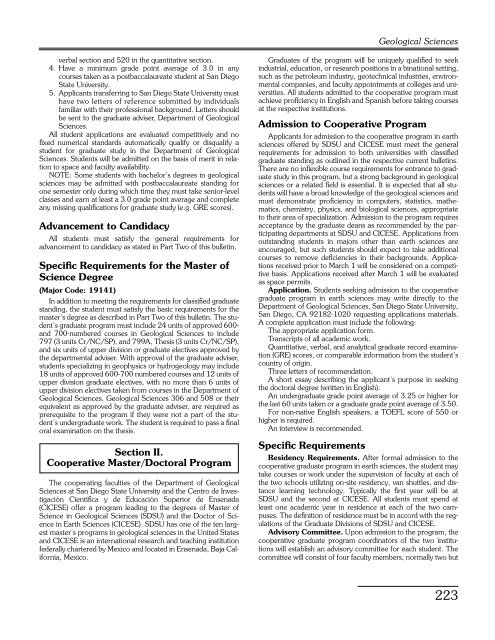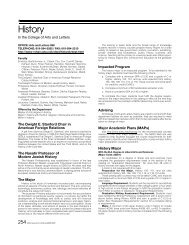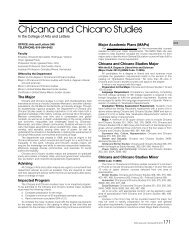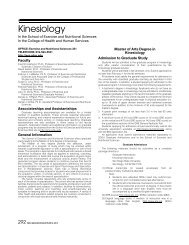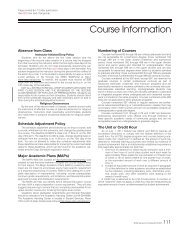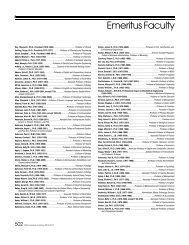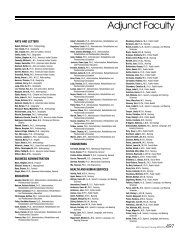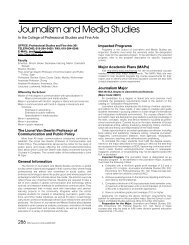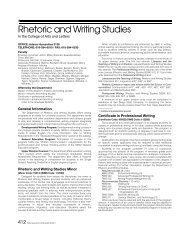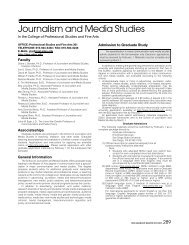President Stephen L. Weber - San Diego State University ...
President Stephen L. Weber - San Diego State University ...
President Stephen L. Weber - San Diego State University ...
You also want an ePaper? Increase the reach of your titles
YUMPU automatically turns print PDFs into web optimized ePapers that Google loves.
verbal section and 520 in the quantitative section.<br />
4. Have a minimum grade point average of 3.0 in any<br />
courses taken as a postbaccalaureate student at <strong>San</strong> <strong>Diego</strong><br />
<strong>State</strong> <strong>University</strong>.<br />
5. Applicants transferring to <strong>San</strong> <strong>Diego</strong> <strong>State</strong> <strong>University</strong> must<br />
have two letters of reference submitted by individuals<br />
familiar with their professional background. Letters should<br />
be sent to the graduate adviser, Department of Geological<br />
Sciences.<br />
All student applications are evaluated competitively and no<br />
fixed numerical standards automatically qualify or disqualify a<br />
student for graduate study in the Department of Geological<br />
Sciences. Students will be admitted on the basis of merit in relation<br />
to space and faculty availability.<br />
NOTE: Some students with bachelor’s degrees in geological<br />
sciences may be admitted with postbaccalaureate standing for<br />
one semester only during which time they must take senior-level<br />
classes and earn at least a 3.0 grade point average and complete<br />
any missing qualifications for graduate study (e.g. GRE scores).<br />
Advancement to Candidacy<br />
All students must satisfy the general requirements for<br />
advancement to candidacy as stated in Part Two of this bulletin.<br />
Specific Requirements for the Master of<br />
Science Degree<br />
(Major Code: 19141)<br />
In addition to meeting the requirements for classified graduate<br />
standing, the student must satisfy the basic requirements for the<br />
master’s degree as described in Part Two of this bulletin. The student’s<br />
graduate program must include 24 units of approved 600and<br />
700-numbered courses in Geological Sciences to include<br />
797 (3 units Cr/NC/SP), and 799A, Thesis (3 units Cr/NC/SP),<br />
and six units of upper division or graduate electives approved by<br />
the departmental adviser. With approval of the graduate adviser,<br />
students specializing in geophysics or hydrogeology may include<br />
18 units of approved 600-700 numbered courses and 12 units of<br />
upper division graduate electives, with no more than 6 units of<br />
upper division electives taken from courses in the Department of<br />
Geological Sciences. Geological Sciences 306 and 508 or their<br />
equivalent as approved by the graduate adviser, are required as<br />
prerequisite to the program if they were not a part of the student’s<br />
undergraduate work. The student is required to pass a final<br />
oral examination on the thesis.<br />
Section II.<br />
Cooperative Master/Doctoral Program<br />
The cooperating faculties of the Department of Geological<br />
Sciences at <strong>San</strong> <strong>Diego</strong> <strong>State</strong> <strong>University</strong> and the Centro de Investigación<br />
Científica y de Educación Superior de Ensenada<br />
(CICESE) offer a program leading to the degrees of Master of<br />
Science in Geological Sciences (SDSU) and the Doctor of Science<br />
in Earth Sciences (CICESE). SDSU has one of the ten largest<br />
master’s programs in geological sciences in the United <strong>State</strong>s<br />
and CICESE is an international research and teaching institution<br />
federally chartered by Mexico and located in Ensenada, Baja California,<br />
Mexico.<br />
Geological Sciences<br />
Graduates of the program will be uniquely qualified to seek<br />
industrial, education, or research positions in a binational setting,<br />
such as the petroleum industry, geotechnical industries, environmental<br />
companies, and faculty appointments at colleges and universities.<br />
All students admitted to the cooperative program must<br />
achieve proficiency in English and Spanish before taking courses<br />
at the respective institutions.<br />
Admission to Cooperative Program<br />
Applicants for admission to the cooperative program in earth<br />
sciences offered by SDSU and CICESE must meet the general<br />
requirements for admission to both universities with classified<br />
graduate standing as outlined in the respective current bulletins.<br />
There are no inflexible course requirements for entrance to graduate<br />
study in this program, but a strong background in geological<br />
sciences or a related field is essential. It is expected that all students<br />
will have a broad knowledge of the geological sciences and<br />
must demonstrate proficiency in computers, statistics, mathematics,<br />
chemistry, physics, and biological sciences, appropriate<br />
to their area of specialization. Admission to the program requires<br />
acceptance by the graduate deans as recommended by the participating<br />
departments at SDSU and CICESE. Applications from<br />
outstanding students in majors other than earth sciences are<br />
encouraged, but such students should expect to take additional<br />
courses to remove deficiencies in their backgrounds. Applications<br />
received prior to March 1 will be considered on a competitive<br />
basis. Applications received after March 1 will be evaluated<br />
as space permits.<br />
Application. Students seeking admission to the cooperative<br />
graduate program in earth sciences may write directly to the<br />
Department of Geological Sciences, <strong>San</strong> <strong>Diego</strong> <strong>State</strong> <strong>University</strong>,<br />
<strong>San</strong> <strong>Diego</strong>, CA 92182-1020 requesting applications materials.<br />
A complete application must include the following:<br />
The appropriate application form.<br />
Transcripts of all academic work.<br />
Quantitative, verbal, and analytical graduate record examination<br />
(GRE) scores, or comparable information from the student’s<br />
country of origin.<br />
Three letters of recommendation.<br />
A short essay describing the applicant’s purpose in seeking<br />
the doctoral degree (written in English).<br />
An undergraduate grade point average of 3.25 or higher for<br />
the last 60 units taken or a graduate grade point average of 3.50.<br />
For non-native English speakers, a TOEFL score of 550 or<br />
higher is required.<br />
An interview is recommended.<br />
Specific Requirements<br />
Residency Requirements. After formal admission to the<br />
cooperative graduate program in earth sciences, the student may<br />
take courses or work under the supervision of faculty at each of<br />
the two schools utilizing on-site residency, van shuttles, and distance<br />
learning technology. Typically the first year will be at<br />
SDSU and the second at CICESE. All students must spend at<br />
least one academic year in residence at each of the two campuses.<br />
The definition of residence must be in accord with the regulations<br />
of the Graduate Divisions of SDSU and CICESE.<br />
Advisory Committee. Upon admission to the program, the<br />
cooperative graduate program coordinators of the two institutions<br />
will establish an advisory committee for each student. The<br />
committee will consist of four faculty members, normally two but<br />
223


